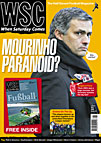 No goals, no away fans, only one proper team – fears of violence made the recent match between PSG and Marseille remarkable, as Neil McCarthy reports
No goals, no away fans, only one proper team – fears of violence made the recent match between PSG and Marseille remarkable, as Neil McCarthy reports
For their recent away match against Paris Saint-Germain, Olympique de Marseille travelled without supporters and fielded a B-team made up of reserves and youth-team players. The boring 0-0 draw was described as a winning hand for OM in a game of poker between the two clubs that has lasted for the past 15 years – they earned a point from PSG and spoilt a match broadcast on the TV station of PSG’s owners, Canal Plus. However, the media and the French League have played down the fact that the game was probably boycotted by OM simply because their fans are sick of risking their lives to go to the fixture, the league going so far as to dock both teams their point.
During the build-up to the March 5 game, OM were on trial for transfer irregularities and 30 PSG fans were arrested for fighting between themselves at a service station on the way back from a game at Nantes.
Around this time OM asked PSG for extra tickets and were refused. OM had been allocated 1,000 seats, but by league rules could have a maximum of 2,000.At a press conference on March 2, OM’s president, Pape Diouf, was furious about this refusal, having also learnt that the extra 1,000 places – in a tier above the places reserved for OM – had already been sold by PSG, over the internet, to their own support. Marseille fans had also communicated to him rumours that hooligan groups were buying up the places. Diouf accused PSG of putting commercial interests before human life and threatened to boycott the match if the seats were not made available to OM supporters.
The next day, PSG replied that OM had no grounds for complaint, that arrangements were identical to those in place for the clubs’ previous fixture in Paris, on November 7, 2004, which had passed without incident. The away section had also been fitted with a plexiglass roof and nets to deflect objects thrown by PSG supporters. Furthermore, the 1,000-fan limit was part of an unwritten agreement between the clubs and had applied to PSG for their visit to Marseille.
Pape Diouf replied that OM would not send a first team and encouraged fans to boycott the match for their own safety. Diouf asked what PSG and the authorities were waiting for to solve the problem: “The death of a man? The death of a child?” He added: “We will not send our supporters so that a drama can occur.”
Conditions may have been the same as in 2004, but the game was still high risk, the most policed in Europe, ahead of Roma v Lazio or Barcelona v Real Madrid. Incidents had occurred around previous matches – including an OM fan paralysed for life by a seat thrown from the PSG end in 2002.
Many, including PSG coach Guy Lacombe, suspected a bluff: “With Marseille, anything can happen,” he said. But OM’s B-team played and the away end was completely empty. The measures still in place, even with no OM fans, showed how ridiculous the fixture has become. The streets around the ground were closed to traffic, alcohol was banned and 1,200 policemen, including riot police, were mobilised for the 5pm kick-off with special powers, until 9pm, to arrest any groups of more than 15 people (resulting in more than 100 arrests).
From the kick-off, the OM team were serenaded with cries of “Enculés, Enculés” (literally “buggered”) from thousands of PSG fans giving a one finger salute – you can buy scarfs with “Bugger OM” written on them outside the ground.
In the book OM-PSG, PSG-OM les meilleurs ennemis, published in 2003, despotic ex-OM president Bernard Tapie claims he created the rivalry with PSG because he wanted a domestic rival capable of keeping his championship-winning team on their toes. The book explains that the rivalry was nurtured and maintained by Canal Plus and the French media in general. The proof is that the game is still a major media event 12 years after Tapie’s reign ended – and 12 years since either club won the French title.
The result gave some OM supporters a chance to gloat at PSG’s humiliation. But it’s possible that March 5 was not just a new chapter in the conflict between the clubs, but the day that they closed the book. As well as being deducted their point each, they must sort out – in writing – next season’s ticket allocations and security arrangements by June 30 or both games will be played behind closed doors. And, with Canal Plus looking to sell a majority share in the club this summer, the hype surrounding the game may die down naturally and, with it, the violence.
From WSC 231 May 2006. What was happening this month